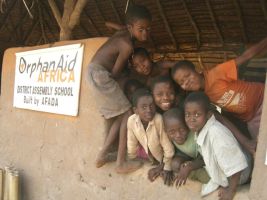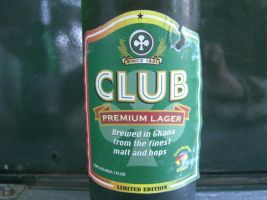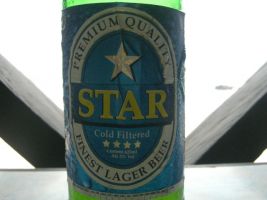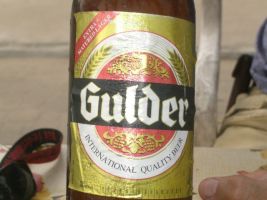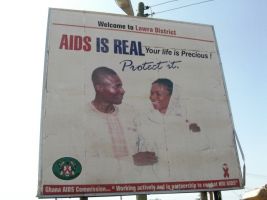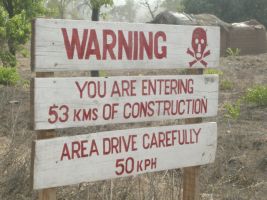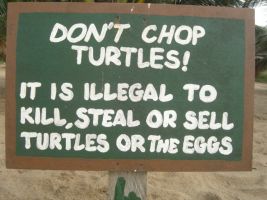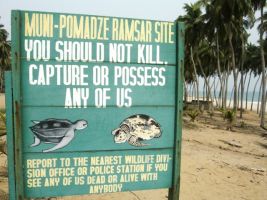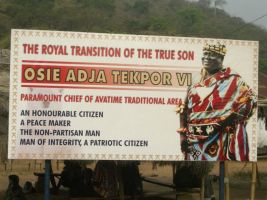
 Italia
Italia France
France Spain
Spain Morocco
Morocco Mauritania
Mauritania Senegal
Senegal Mali
Mali Burkina
Burkina Ghana
Ghana Togo
Togo Benin
Benin Nigeria
Nigeria Cameroon
Cameroon Gabon
Gabon Sao Tomè
Sao Tomè Gabon 2
Gabon 2 Congo
Congo Congo DCR
Congo DCR Angola
Angola Namibia
Namibia Sud Africa
Sud Africa Namibia 2
Namibia 2 Botswana
Botswana Zimbabwe
Zimbabwe Botswana 2
Botswana 2 Sud africa 2
Sud africa 2 Swaziland
Swaziland Mozambico
Mozambico Malawi
Malawi Tanzania
Tanzania Rwanda
Rwanda Uganda
Uganda Kenya
Kenya Etiopia
Etiopia Sudan
Sudan Egitto
Egitto Libia
Libia Tunisia
Tunisia Malta
Malta
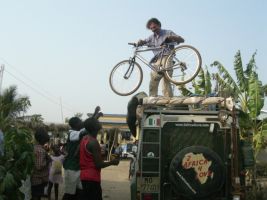
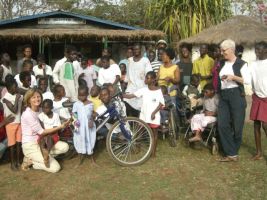
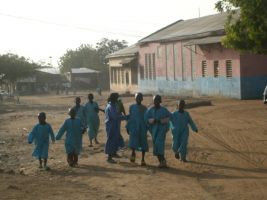
Welcome to Ghana – 28 Jan 2008
Hamele border - a small frontier. Within half an hour, we are in Ghana without any problems. After 3 months speaking French, it is now time for English. From 1st January, Ghana changed its local currency; from cedi to new cedi, which means, that 10.000 old cedi are now worth 1 new cedi. The old notes have already been replaced with new ones, but as yet, coins are unavailable. Officially, one new cedi is equal to one US dollar. However, banks will only exchange currency for a hefty fee, sometimes as much as 10%. Here, in the North of the country, it is still difficult to find the local currency.
Entering Ghana, we notice that the piles of plastic rubbish bags have disappeared and mud huts have made way to small, simple houses.
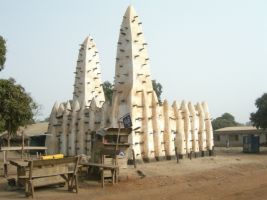
WA – 28 Jan 2008
We continue travelling south. So far, there isn’t much to see, but we decide to stop in Wa, where we treat ourselves to a nice shovel for 2 euros. In the absence of campsites, we find and stay at the small, very clean “African” hotel. GPS 10 04 370 002 30 420
This evening, Ghana are playing Morocco in the African football Cup. Half an hour before the start of the match, the streets are completely deserted. It is the quarter final in Accra. Ghana win 2-0. Now, there is pandemonium on the streets. But the Africa Cup is still further ahead. Next match, 10th February in Accra.
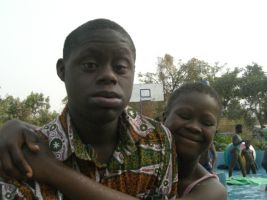
Hand in Hand - Nkoranza - 29 Jan 2008
A year on and I am back at the Hand in Hand Centre. The guest rooms available, give some financial help. GPS N07° 34.300 W001° 42,054.
The last time I was here, Elfoavventure donated some medicines. This time we leave a token and a bicycle. All details are in the Solidarity section.
In the meantime, we take advantage of the peacefulness of this place and set to work on some K7 maintenance. After about 14.000km, we need to change the oil and filter. We grease the front joints. The battery has completely run down, as it is charged exclusively by the solar panel. The fridge is off; it works on 220V. We move the compressor from the service battery and place it with the engine battery; this is so we can use it whilst the car is running. All this takes a whole day. The light for the central differential lock is not working and I do not understand why. I remove the dashboard to check; the bulb hasn’t gone and the connection is sound, everything seems fine; very annoying!
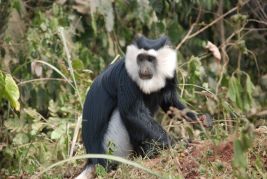
Monkey Sanctuary – 1st Feb 2008
The Monkey Sanctuary, named after its two colonies of monkeys. They are protected by law and the locals believe them to be sacred.
Accompanied by a guide, we visit the forest, where we see some beautiful specimens of the “strangler” ficus and the foregone tree, onto which the ficus wraps itself.
In these trees, the black and white monkeys with the more common “mona” provide a pleasant respite, before we head towards Kumasi, the city of the Ashanti population.
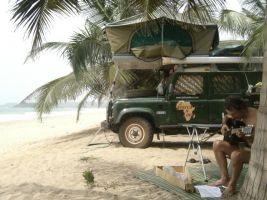
Giuliana – 2 Feb 2008
We stay at the Presbyterian mission close to the centre (GPS 06 41 280 W001 37 260), where we meet Giuliana, from Turin. She is travelling on her own in a Toyota and has had lots of experience as a keen African traveller. We share our impressions, tips and GPS points, which could be useful on our journey.
The next day we manage to fill the gas tank and we head towards…paradise….
On the beach, shaded by palm trees, soothed and lulled by the gentle, tranquillizing sound of the ocean…the place is Green Turtle Lodge.
GPS N04°45.506 W002°01.280
Time, just for a few peaceful, dreamy, lazy days…..zzzzzzzzzzzzzzzzz
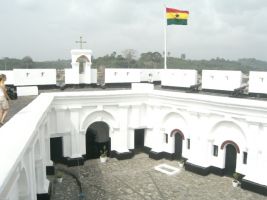
Fort Metal Cross - 4 Feb 2008
Along this coast there are many fortresses; Portuguese, Dutch, English and Danish. One after the other, through the centuries, from the end of the 13th century to the 19th. In the beginning, gold and ivory were exchanged for iron tools, old weapons and glass pearls. After the discovery of America, the principal commercial interest became slavery. Slaves captured and sold to the white populations by the Ashanti.
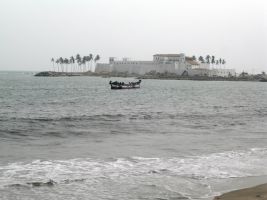
Elmina - 5 Feb 2008
Elmina is a fortress used during the slave trade and is one of the largest; it is a most dreadful indictment to slavery.
Set up as a Portuguese fortress to hold gold and spices (the name means mine), it was turned into a prison for over 1000 slaves destined for America.
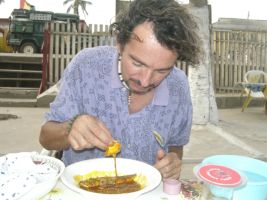
Stop dribbling y'r soup...!
On our travels, we endeavour to try the many varieties of local dishes; some are quite delicious, some are an acquired taste, the taste of some being a little more difficult to acquire then others. This was one such dish, the taste, and not to mention its consistency of which, I would defy anyone to acquire! It was really quite terrible, an oozy, shudder inducing fish soup, with a sticky type of dough, eaten with your hands…mmm, yummy!
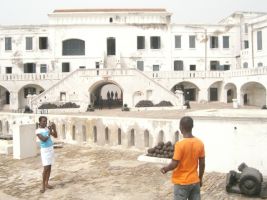
Cape Coast - 6 Feb 2008
The slave fortress built on the Cape Coast is very striking. We stop nearby the beach and the centre: Oasis Beach Guest House, 3 cidi a head. GPS N05°06.211 W001°14.611.
Humidity is at its highest…the only relief is under a shower or in the sea.
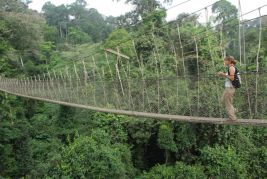
The flying park – 7 Feb 2008
We pay a visit to the tropical forest, 30km from the coast. The climate is humid to the power of two! Inside the Kakum National Park, we see elephants and many specimens of butterflies and birds. The park is famous for an aerial track created in the 90’s. You can walk along bridges that are suspended from the tallest trees, some hundreds of metres up. The experience is unbelievable, but nothing to do with bird watching.
The guide tells us, the noise in the area has scared-off most of the animals, driving them further inwards. So, all your left with, is about half an hour of stumbling about “It’s a Knock-out” style.
If we had known, we could have saved the 18 cidi that we had to pay.
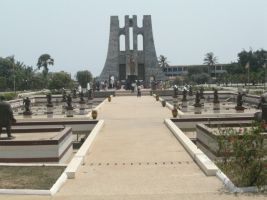
Accra – 7 Feb 2008
Here we are in the chaotic capital. Traffic is at a stand still, as millions of drivers are hoping to get to a TV screen in time for the match. Ghana are playing Cameroon in the Africa semi-final. It seems everybody is wearing or wrapped in a flag. On every vehicle, there is a flag; we counted eight on one car, but we will make do with just one. It is almost dark when we reach the Irish Pub, a restaurant and a pub run by an English couple. Other over-landers have recommended it. However, we are disappointed. It does not seem to be as people have described it. We are charged 20 dollars to park in the garden; there is a sink, but no water. Toilets are quite dirty and are shared with the employees. There is a shower in the men’s bathroom only. The door does not close and there is no light. There are no shower facilities for women. The Wi-fi connection is very expensive at 3 dollars an hour; far too much – most other places charge less than a dollar. As it is now dark, we have little choice but to stay. We would not recommend this place.
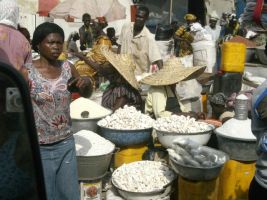
Next day we are off for our visas. It is 8 o’clock and the roads are already chaotic.
Ghana has lost the semi-final and so they will play a third and fourth place play-off. The people are in a sombre mood.
Following the GPS points that other over-landers have given us for the Nigerian Embassy, we find ourselves in front of a company that manufactures pneumatics. The Embassy has moved!
We search for a while, but with no luck. We finally call the Italian Embassy where the secretary gives us the new address: GPS N 05°36.409’ W 00°12. We finally arrive at 11:30. An unfriendly operator tells us to come back on Monday, as the office only collects the passports on Monday, Tuesday and Wednesday morning. We cannot get to the bottom of what documents we will need. A porter who feels pity for us, gives us two application forms to fill in. Then, we leave.
We are now off towards the Benin Embassy! GPS N 05°35.180’ W 00°10.790’ which is concealed amongst the small streets. By midday we have handed in our passports. There is the usual application form to fill-in, two pictures and 25 dollars for a two-week Visa. We collect them at 2 o’clock in the afternoon. Quick and efficient.
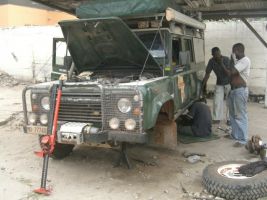
Pit Stop- 8 Feb 2008
We are looking for a mechanic, a Land Rover expert, who has been recommended to us by many over-landers at GPS N 05°34.167’W 00°12.313’. There is no sign of him in the workshop and it takes us a while before we find him. We agree to bring K7 back on Monday. The hand-break cable needs to be fixed and a few other things need to be checked, in particular, a very worrying noise that is coming from the rear axle. Is it possible, that with all the sand and 15000km, that the rear axle is already worn out? We need to verify this before we reach the muddy tracks of Cameroon and Gabon.
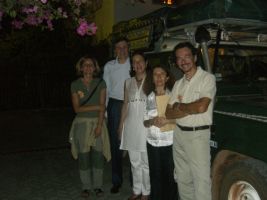
We spend a lovely evening with the Italian Ambassador Fabrizio De Agostani and his wife. He has been kind enough to write a presentation letter for us, to present to the embassies when applying for visas for Togo, Nigeria and the most difficult Angola. We gratefully accept our ambassador’s offer; this letter will be very useful. We stay at the Guest House of the Methodist mission. Air-conditioned rooms, a fridge, TV, small balcony, private bathroom with hot water. The guesthouse also has a secure garden. All for only 22 Cidis. GPS N 05° 33.579’ W 00°12.324. The place is located in front of the National Museum… finally, a little good fortune! We had been searching around for the whole day just to find reliable, inexpensive accommodation. Moreover, we find it here in the capital, where we need to stay for a full week…nice!
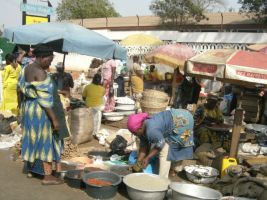
National Museum – 9 Feb. 2008
To escape from the humidity and the heat, we decide to visit the museum. There are many fine statues, Ashanti artefacts and a number of interesting exhibits on Ghanaian history. We also pop to the colourful Makola Market and for a few hours, we browse around the many stalls. Some sell giant snails and some very interesting vegetables that we have never seen.
We have dinner by the sea with some Ghanaian friends from Ghana Coop. We met back in Modena, during the planning of works to re-wire a village close to Accra. The evening is accompanied with local live music.
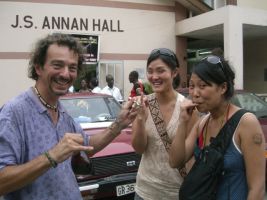
Chinese, Football and Balsamic vinegar – 10 Feb. 2008
Today is the African Cup final: Cameroon-Egypt. Everyone is off to the Stadium. On the other hand, we decide to visit the craftsmen market to buy some articles for the next Elfo avventure fund-raising events back in Italy. After a few hours, we are ready to go back to our room for a refreshing shower. The heat and humidity are quite intense.
Back at the guesthouse, we bump into two Canadian-Chinese friends that we met at the Tourtle Lodge and Cape Coast. They taste and enjoy our Balsamic vinegar from Modena. From our small balcony, we watch the fireworks, which close the cup final. The African champions are Egypt.
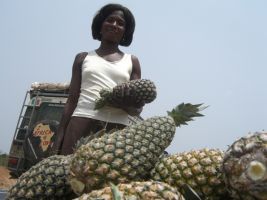
Visas and Pineapples – 11 Feb. 208
On Monday, we will go to collect our Visas from the Nigerian embassy. First, we visit the Italian Embassy, where we chat with our fellow compatriots who work there. .
Armed with every document we think they may ask for, our letter of presentation from the Italian Ambassador and a lot of patience, we submit the application. 48hours later and 56 dollars a head lighter, we get what we asked for.
We take the letter to the Angolan Embassy, but after waiting for 20 minutes, we are told, it is late and the Ambassador is out and they do not issue visas to non-Ghanaian residents’ anyway…pompous prat!
It is dark and the mechanic has asked us to come back the following day. We therefore decide to visit an orphanage. Along the way, we buy some delicious pineapples.
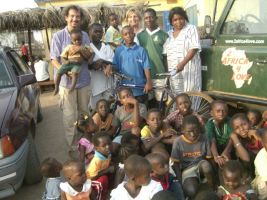
Emma’s orphanage - 11 Feb. 2008
We finally get to Awuto Bawjiase (not without trouble), where Emma’s orphanage is situated. We know of this centre through some Italian friends that were here last year.
We deliver the second bicycle from Italy; we leave some clothes for the children and an Elfo token. More details are in the solidarity section.
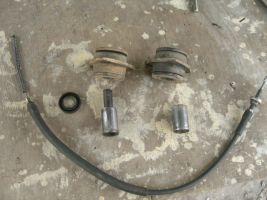
Day One - with the mechanic – 12 Feb 2008
We get up early and set to work on our Land Rover. We change the hand break cable and the oil seal on the front axle shaft. The mechanic suggests we should change the four bushes on the rear axle. Considering the roads we still have ahead of us, we decide to go ahead and change them. It is a long and tiring day, interrupted only by a quick red-red (a local dish with beans, sauce, fried bananas and fish…delicious!) at the nearby restaurant.
We leave the garage late in the evening, secure in the knowledge that our mechanical problems have been sorted (poor fools!).
Gianna, an Italian lady, who has been living here for over 20 years, has kindly invited us to dinner in her beautiful African house. She works for Research & Cooperation, an independent organization that manages major projects that help and support the people. We have a very pleasant evening.
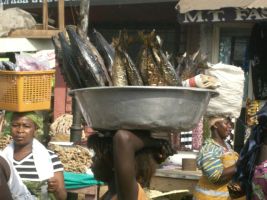
Trouble Ahead – 13 Feb. 2008
Our stay in Accra is longer than expected because of problems we have had with our visas and, in particular, the problems with the Land Rover.
After collecting our visas for Nigeria, we apply straight away for our visas to enter Togo. GPS details for the Embassy: GPS N 05°34.563 W 00°10.726 for. We need three pictures and three application forms, 10000CFA each and after 24 hours we can collect them.
The Land Rover is making an horrendous noise. We go back to the mechanic and after checking and trying everything, we are told to come back tomorrow.
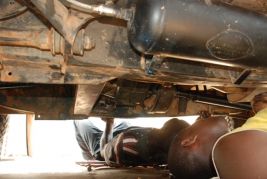
Day Two - with the mechanic – 14 Feb. 2008
A fellow countryman, who works at the Italian Embassy, suggests we should see his mechanic. Contrary to what we thought, here in Ghana, there are very few official Land Rover garages. We therefore decide to call on Mark, who has worked for an official dealer for 15 years.
We work from 8a.m. to 7:30pm and are still no nearer to finding the problem. We try everything, but still we are no wiser. We even call McDaniel back in Modena... several times. Still, no results, nothing we do works. That evening, the terrible clanking noise is even louder.
We need to stay another day in Accra to try to source the problem and repair it (our visas for Togo are valid from tomorrow!).
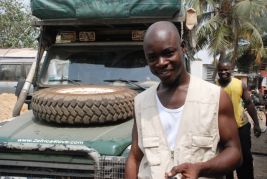
Day Three - with the mechanic – 15 Feb. 2008
And so, we begin again, searching, checking everything. The mechanic suggests that the gearbox could be the source of our problem and that we should replace it! ( … “the gearbox?... what! I don’t want to... what is going on?”). There are three possibilities here:
One: they know nothing and are just stabbing in the dark, eliminating parts piece-by-piece hoping they will just stumble upon a solution.
Two: they know everything and are taking us for a very expensive ride.
Three: and this is the one I would prefer – we are in safe hands, it’s just that it is a very difficult problem to solve.
Finally, at 12 o’clock on this third day, K7 is back in the land of the living and is back on song. It turns out, that the problem was due to the incorrect assembly of some of the parts. So, what we have here is largely option one but with a little bit of option three thrown-in.
Overall, Mark the mechanic at Pit Stop is very helpful and prices are reasonable. He has a place where you can stay the night (free of charge). There is a restaurant nearby and many internet points. Mechanically speaking, as I said, it was all very much, a bit hit and miss and quite stressful. Mark (in the picture) has had a lot of experience working on Land Rovers, and he is honest and reliable. The problem is, that he is very often away and the mechanical competence of his colleges does not inspire confidence. I suggest, if you need a mechanic when in this area, make sure you ask for Mark and that he is the one who advices you and takes care of your car.
In the end, I suppose all is well that ends well, and in the end we leave satisfied. GPS N05°32.100’W000°14.190’
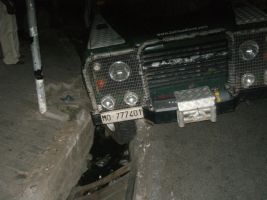
We celebrate in the gutter – 15 Feb. 2008
We are on our way to a nice restaurant in Osu to celebrate - ironically – K7’s resurrection and her continuing health. When, in the middle of Osu, the liveliest part of Accra this happens!
We decide to test the depth of the open sewers that run along the city streets of Ghana. It is difficult to understand that in one of the most developed places in West Africa the sewers are completely open.
After an hour, a hydraulic jack and some skilful maneuvers by an experienced Camel Trophy contestant, we are free. Of course, and the hundreds of tips and comments from passers-by, taxi drivers, police officers, street vendors, etc… Everyone, or so it seemed, throwing in their ten cents worth with a “you don’t wanna do it like that…you wanna do it like this!” all hoping for a final reward.
During this rescue operation, many things found their way into the thick black smelly stuff; our front right wheel and our hydraulic jack just to mention a few. Oh, and a new mobile phone that belonged to one of our many “advisers” who, after collecting the three pieces, into which, a mobile phone normally breaks - keypad, battery and front cover - left looking quite disgruntled.
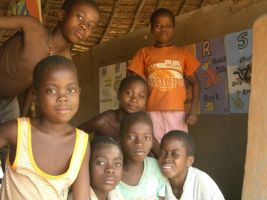
We finally leave Accra – 16 Feb. 2008
We have collected a few parcels from Italy delivered to Shirley’s house. Shirley is a lovely girl from Ghana who works for Ghana Coop who has kindly allowed us to use her personal address. Unfortunately, the last Harry Potter book has not arrived. Desperation! I will have to wait until the end of this journey to read it.
We have not been able to find a Michelin Tyre to substitute the one torn in Mauritania. After two “African” repairs in Dakar and Burkina, it is still carrying us around. We head north towards Bianca’s orphanage. We leave an Elfo token. Further details in the Solidarity section.
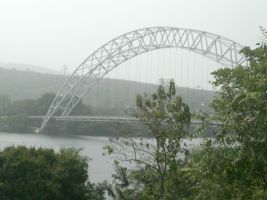
A Bridge on the Dyke
The road to Togo crosses the Volta Lake, the world’s biggest artificial reservoir, formed by the Akosombo dyke.
We cross the Adome Suspension Bridge that spans the reservoir
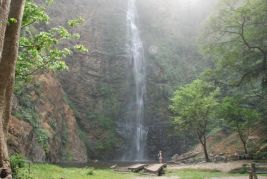
Wlifalls Waterfalls – 17 Feb
Our last stop in Ghana covers a 2-hour-walk in the forest to reach the beautiful waterfalls. The entrance fee is 6.5 Cidis each, including the guide, who then asks for a 3 Cidis tip. We decide to go on our own. Butterflies pervade the path.
We camp at Waterfall Lodge, a nice clean place run by two Germans who where former over-landers.
GPS N07°06.934’ E000°35.307’
The Togo frontier is 200 metres from the Lodge. We are there in a few minutes.
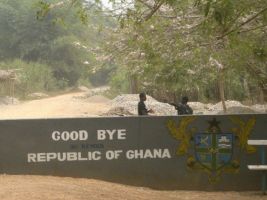
Ghana - Our Impressions
So far, definitely the most developed place we have visited. As soon as you enter the country, the difference is immediate, even though the north is not as wealthy as the coast. In the countryside, carts and donkeys make way to tractors. The Means of transportation is generally more modern and recent. Almost all roads are asphalted or under construction. Places of religion are many and varied. It is usual to see up to eight different churches or mosques among twenty or so houses.
Taxis are the main means of transportation. Everybody uses them. Buses are plentiful and are well ordered and organized. The borders are easy to cross, coupled with the helpfulness and friendliness of police officials. Roadblocks are frequent, but they rarely stop drivers.
Food is varied and pleasant. Red-Red is the best dish.
In Ghana, we found the people to be more reserved, unlike the more boisterous found in previous places that we have visited; probably a hangover from British colonization.
Unlike in some of the countries we have visited, cars are not a target for stones.
